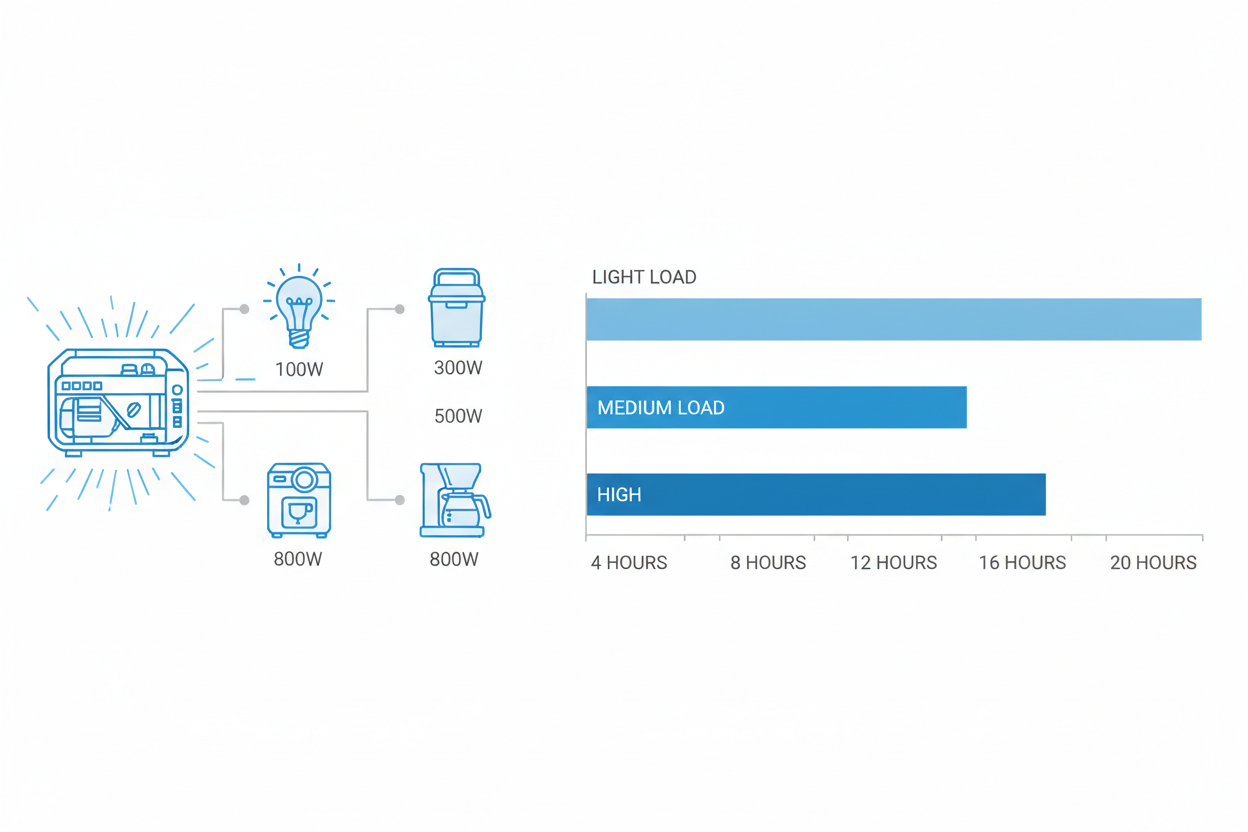How Long Can a Camping Generator Run? Runtime Explained
Generator runtime determines how long campers can power lights, coolers, chargers, and cooking devices. Understanding fuel size, load level, and eco mode helps estimate realistic runtime for outdoor trips.
Inverter generators vary widely in runtime depending on wattage draw and fuel type.

How Load Levels Affect Runtime
Runtime changes dramatically as generators move from light to heavy loads. Lower loads use less fuel and allow generators to operate at reduced RPM in eco mode.
Higher loads increase fuel consumption sharply as engine speed rises to meet demand.
- 25% load: longest runtime with quiet operation
- 50% load: balanced runtime for most campers
- 75% load: noticeably shorter runtime with higher noise
Typical Runtime for Camping Generators
Most compact inverter generators run seven to twelve hours on a single tank at light loads. Medium loads reduce runtime to four to seven hours depending on model and tank size.
Heavy loads reduce runtime significantly and increase noise during operation.
- 1000–2000W models: 6–10 hours at 25% load
- 2000–2400W models: 7–12 hours at 25% load
- 2400–3000W models: 8–14 hours at 25% load
Eco Mode and Fuel Efficiency
Eco mode helps optimize runtime by lowering engine speed during low draw periods. Campers using lights, chargers, and coolers benefit most from extended efficiency.
Eco mode automatically increases speed when high-draw appliances activate.
Fuel Type and Runtime Differences
Gasoline offers higher energy density and provides longer runtime at the same load. Propane burns cleaner but reduces total wattage slightly and shortens runtime.
Dual-fuel generators allow campers to switch between fuels based on availability.
- Gasoline: longest runtime, best for high loads
- Propane: predictable runtime, best for long storage
Managing Loads for Longer Runtime
Campers can extend runtime by reducing simultaneous device use. Staggering higher-watt appliances keeps overall load low and efficient.
Proper planning helps preserve quiet operation and fuel savings.
- Turn off cooler during coffee brewing.
- Charge devices during low-demand periods.
- Avoid running heaters and kettles at the same time.
Runtime Tips for Overnight Use
Many campers need generators to run quietly for overnight CPAP or lighting. A lightly loaded generator operates efficiently with minimal noise during sleep hours.
Avoid high-draw appliances at night to ensure extended runtime.
When to Consider Larger Models
Campers with heavy cooking or entertainment setups may need larger generators for stable runtime. Units above three thousand watts handle extended medium-load operation better.
Larger fuel tanks also reduce the need for daytime refueling.
Conclusion
Generator runtime depends on load level, fuel type, eco mode behavior, and tank size.
With proper planning, campers can achieve long, quiet, and efficient power for all outdoor activities.
